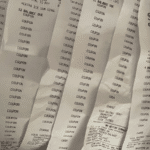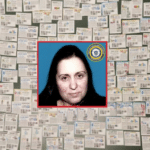Moviegoers might find coupon counterfeiting to be a quirky crime that doesn’t really hurt anyone in the end. Those who have followed the recent case of a Connecticut coupon counterfeiter may be inclined to agree, while the case of a Virginia coupon counterfeiter might have them thinking otherwise.
Public reaction to, and criminal penalties for, coupon counterfeiting are all over the map. That’s why an organization dedicated to fighting fraud has released a report that shows just how serious coupon crime’s impact is on individuals, businesses and society at large.
The Center on Shadow Economics has concluded months of interviews and research to produce “Counterfeit Coupons: Instruments of the Noble Thief or Weapons Against our Communities?” The report aims to show “the devastating impact counterfeit coupons have on our communities.”
Author David Lake, CEO of the Center on Shadow Economics (CSE), is a 30-year police veteran best known for leading the 2012 investigation that broke up a $40 million counterfeit coupon ring in Phoenix. That’s the case that inspired the new movie Queenpins, which is now playing in theaters. While the movie takes some liberties with the story and turns it into a comedy, the report is something of a counterpoint, emphasizing that in real life, coupon counterfeiting is no laughing matter.
“We don’t want people to think it’s funny,” Lake told Coupons in the News. “We can’t say that it doesn’t matter that a person is ‘only’ selling coupons when we look at the amount of economic damage that does to businesses, which means businesses have less money to pay for all their programs and all the taxes. It’s a huge interconnected web.”
There are many types of coupon crimes, from knowingly misusing coupons to stealing coupon inserts. But the economic damage they cause aren’t as quantifiable as the losses attributed specifically to counterfeit coupons. Until now, the industry has largely relied on ballpark estimates in determining how big the counterfeit coupon business is. So CSE collected three years’ worth of data on counterfeit coupon losses from the country’s three largest coupon clearinghouses to come up with a specific dollar figure.
What they found was that counterfeit coupons during that time period caused more than $165.7 million in direct losses to retailers and manufacturers. And that was only the tip of the iceberg. “The damage extends far beyond the initial victim and permeates through our economically interconnected communities,” the report found. Working with economic researchers at Arizona State University, CSE extrapolated the data and determined that absorbing those losses caused businesses to eliminate 2,178 jobs, causing more than $143 million in lost labor income and $41 million in lost tax revenue.
CSE says its analysis shows that losses attributed to counterfeit coupons aren’t “simply absorbed on a corporate ledger somewhere.” They have an impact on companies, their employees and the economic prosperity of the communities where they do business. And trickle-down effects are felt by honest couponers as well, in the form of fewer coupons and reduced face values, as affected companies are “forced to recover their losses in other ways.”
While the coupon industry has come up with newer and better ways to combat counterfeiting, they haven’t eliminated it altogether. When the counterfeiting ring that Lake investigated was broken up with the arrests of three Phoenix women in 2012, it made international headlines. Reporters and readers were astounded by the novelty of what CSE’s report describes as an “ordinary suburban housewife” who “became the Queenpin of a multimillion-dollar criminal enterprise.”
Yet similar crimes keep happening. An “ordinary suburban housewife” in Virginia who “became the Queenpin of a multimillion-dollar criminal enterprise” of her own was sentenced to 12 years in prison last week and ordered to pay more than $31 million in restitution – nearly a decade after the Phoenix case first captured the public’s attention.
The problem, CSE believes, is that the public at large still doesn’t perceive coupon crime to be that big of a deal. The movie Queenpins portrayed two coupon criminals who justified their actions by saying “the system has set us up to fail,” so the only people who get ahead are those “who don’t follow the rules.” It’s a perception CSE says is all too common.
Coupon criminals “tell themselves they have no choice because ‘the system’ is against them, and the only way to get ahead in life is to break or bend the rules,” the report reads. “Many indulge in this fallacy by believing the world owes them and they have a moral right to steal from those who have more than they do.” The report bemoans the “level of apathy, and even tacit endorsement” of such crimes, not only on the part of average citizens, but on the part of the criminal justice system as well. To some, CSE says, “coupon fraud can appear relatively harmless when compared to drugs, gangs, and violence.”
Consider the case of Thomas Papcin, who was convicted for operating a years-long counterfeit coupon scheme – and received a sentence of probation and no restitution. His lawyer successfully argued for a lenient sentence, claiming that counterfeiting coupons “did not have the damage to the community seen in other areas of federal prosecution, such as drug trafficking, crimes of violence, or crimes involving children or corruption of American institutions.”
“There is a perception from some that since being in business is a choice and crime is inevitable, getting victimized is part of ‘the cost of doing business’,” the CSE report reads. “This idea is essentially victim-blaming and is akin to dismissing burglary as ‘the cost of owning a home’.”
While the printed coupon “functions much like printed money, it has none of the institutional protections,” the report goes on. “This places most of the burden of protecting coupons on the industry itself.” The Coupon Information Corporation represents the industry in fighting coupon misredemption and fraud, while working with law enforcement to investigate coupon crimes – and sometimes educating them about coupon fraud in the process. One industry participant told CSE that “law enforcement should pursue counterfeit coupon users in much the same way they would pursue a shoplifter or someone who used counterfeit money.” But that doesn’t always happen.
The bottom line, the report concludes, is that “businesses are not faceless entities to be demonized; they are the economic engines of our communities.” So coupon counterfeiting is far from a victimless crime – instead, it turns everyone into victims. “As members of this interconnected community, it is profoundly important that we fully understand the criminality of coupon fraudsters and the repercussions their crimes have on all of us,” CSE says. So if you’ve ever been tempted to misuse a coupon, or to buy a coupon online that may be stolen or counterfeit, consider the consequences. A small amount of savings now, could result in a much larger price for all of us to pay later.

















Coupon counterfeiters are probably also thieves of products and return fraud, etc.